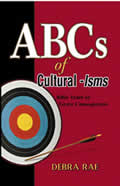OUR NATION'S HERITAGE: NOBLE OR COMPROMISED?
By
Debra Rae
November 23, 2009
NewsWithViews.com
Ah, the innocence of youth. When good men seem really, really good; and bad men seem really, really bad. Folks are heroes or villains—nothing more; nothing less. While it’s true that “black” and “white” exist, so do varying shades of “gray.” As we mature, we learn well that even the best men and women among us are flawed, some seriously.
Take, for example, King David, Israel’s greatest and most beloved king. An ancestor of Jesus and a man after God’s own heart, David was honored for expanding the kingdom, for his bravery, and for his faithfulness in friendship. This is the same David who took for himself another man’s wife and, then, used his kingly clout to wipe out the competition.
Old and New Testaments alike are replete with similar examples. The most prominent of the twelve apostles, Peter denied His Lord, yet became an outstanding leader of the early church and, in the end, died a courageous martyr.
Despite grievous shortcomings, mercy and grace overtake the repentant—sometimes through the godless. For instance, Cyrus the Mede gave rise to the renowned Persian Empire and, as such, exercised policies of moderation that naturally extended to the Hebrews. For his enabling their return to Judea to rebuild the Temple, Scripture calls even this heathen king an “anointed one.”
America’s Founding Fathers
Bible personalities
are not alone in failure. Christian J. Pinto gives compelling evidence
that not every founding father of our great nation was what history
portrays him to be. While Pinto’s exposé of Secret
Mysteries of America’s Beginnings paints Thomas Paine,
John Adams, Thomas Jefferson, and Benjamin Franklin in less than favorable
light, God nonetheless used them to establish a nation with indisputably
Christian underpinnings.
• Thomas Paine
To his credit, Revolutionary writer Thomas Paine was said to have “stirred the American colonies to independence.” William J. Federer quotes Paine as resigning to the will of his Creator God. However, in The Age of Reason, Paine proclaimed his own mind to be his church; he believed in no creed of the Protestant church, or any church he knew of. According to leading historian Dr. James H. Billington, Paine lived immorally in a ménage a trois with [Nicholas] Bonneville and his wife (1797-1802). Though Federer suggests that Paine repented of publishing the Age of Reason, other historians concur that, even when dying, Paine flatly denied Christ and refused personal salvation, when offered.
• John Adams
And then there’s John Adams, a Unitarian Universalist. His wife, Abigail, espoused the teachings of her father who likewise rejected the doctrine of original sin, as well as the full divinity of Christ. Both John and Abigail emphasized reason and morality in religious life. Federer quotes Adams’ last words as “Thank God, Jefferson lives!” Curious words, for a dying Christian. In The American Leadership Tradition, the foreword for which was written by Charles Colson, Marvin Olasky portrays slave-owner Thomas Jefferson as “an infidel” and “a shameless philanderer.”
• Thomas Jefferson
Nevertheless, in a letter to Dr. Benjamin Rush (21 April 1803), Jefferson proclaimed himself “a Christian in the only sense in which he wished anyone to be: sincerely attached to His doctrines in preference to all others.” Jefferson likewise eschewed “falsehood of the tongue.” Still, some believe his God-talk to be more reflective of illumined Freemasonry than that of biblical Christianity.
The so called “Jefferson Bible,” entitled The Life and Morals of Jesus of Nazareth, completely omitted the book of Revelation. Scripturally, to “take away from the words of the book of this prophecy” is to forfeit inclusion in the Book of Life (Rev. 22:19). That Jefferson dismissed the virgin birth, Christ’s miracles, His resurrection and ascension speak to Jefferson’s expressed wish that the United States would become Unitarian.
• Benjamin Franklin
While Franklin was said to acknowledge the superior morality of Jesus Christ, he outright rejected His authority. Even so, William Federer pairs Franklin with the Great Awakening preacher, George Whitefield, alleged to be a very close friend of his. Franklin would have “a Bible and a newspaper in every house.” His appeal for prayer has since resulted to this day in prayers opening both houses of Congress.
Said to be the most influential American to invent the type of society America would become, Benjamin Franklin nonetheless hob-knobbed with an English association known as the Hellfire Club. Founded by Sir Francis Dashwood, the club’s membership mocked traditional religion and partied with prostitutes.
Significantly, Rosicrucians claim Franklin and Jefferson as fellows for embracing doctrines advanced by occultist Madame Helena Petrovna Blavatsky. A Russian born medium, Blavatsky is best known as the spiritual godmother of today’s New Age Movement; and Adolph Hitler admired her writings.
Our Nation’s Foundational Quandary
Despite these observations,
five-time Governor of Virginia, Patrick Henry (1736-1799) asserts, "It
cannot be emphasized too strongly, nor too often, that this great nation
was founded, not by religionists, but by Christians; not on religions,
but on the Gospel of Jesus Christ." Armed with compelling evidence,
good Christians proclaim with Henry that ours indeed is a noble spiritual
heritage.
Other equally devoted Christians insist, to the contrary, that many
of our nation’s founders were deists skilled at God-speak, but
practiced in enlightened principles of occult Illuminism. Birthed from
the ancient mysteries, images of gods and goddesses, zodiacs, obelisks,
reflecting pools, the illuminist trapezoid and “eye of Lucifer”
(as portrayed on the one-dollar bill) represent but a sampling of the
cacophony of arcane symbols found throughout our nation’s capitol.
Let’s Hear it for Our Biblical Heritage
Some insist that “If it walks like a duck, quacks like a duck, and looks like a duck, it must be a duck,” yet most agree that invoking the name of God to bless America may or may not signal deep conviction. When using the phrase, “God bless America,” it is apparent that Bill and Hillary Clinton, Michael Moore, Barak Obama, Al Gore, George Bush, Jimmy Carter, Jon Stewart, and/or Ronald Reagan come from unique vantage points.
In public statements, especially at the onset of his tyrannical reign, Hitler often spoke positively about the “Christian” heritage of German culture; moreover, he expounded belief in the "Aryan" Christ. Hitler’s God-speak was unquestionably hollow; no one believes Hitler to be a true disciple doing Christ’s work on earth.
Accordingly, given character flaws of her founding fathers, many refuse to acknowledge America’s clear Christian heritage. Fact is our nation was founded, not on “the arm of flesh,” but rather on the One whose identity is prominently displayed on our nation’s currency. The manifest starting point of our Declaration of Independence is faith in the Creator, who singularly imparts human rights.
What many fail to realize is that our nation’s true Christian heritage actually predates the likes of Thomas Paine, Thomas Jefferson, Benjamin Franklin, and John Adams, as evidenced within the first colonial grant made to Sir Walter Raleigh (1584); in the first charter of Virginia, granted by King James I (1606); in subsequent Virginia charters (1609 and 1611); and various ones granted to the other colonies.
A mural depicting early settlements of the East Coast of North America—namely, St. Augustine (1565¬), Plymouth (1620), Jamestown (1607), and Savannah (1733)—covers the ceiling of the Cox Corridor in the House Wing of the U.S. Capitol Building. The map reminds us that the European history of the United States began on a sandy inlet called Matanzas.
• St. Augustine, Northern Florida (1565¬): Religious Freedom
Founded by Pedro Menendez de Aviles of Spain, St. Augustine has been in existence continuously since 1565. Therefore, it is the oldest European city in the United States. Settlers were Huguenots—specifically, French Calvinists who broke away from the Catholic Church to worship the Lord free from Rome’s interference.
Their hope in colonizing was to find a way of escape from persecution. You see, in choosing to study the Bible for themselves and be led by the Holy Spirit in everyday life, Huguenots were forced to fellowship in secret while huddled inside dark caves.
Upon landing on 30 June 1564, Rene de Laudonniere led the colony in prayer, praising God and asking that He “ayde us in all our enterprises, that all might turne to his glory and the advancement of our King.” For good reason our nation’s motto is “In God we trust.” Arguably, our national heritage springs from this heartfelt prayer.
Unfortunately, under command of King Philip II of Spain, General Menendez drew a line in the sand, giving each man opportunity to renounce his faith and live, or cross the line and meet his Maker. In an act of conscience, 111 Christian men chose to cross that line and suffer martyrdom—this, for the noble cause of religious freedom. In what became a series of massacres, over 200 men were slaughtered. Fittingly, Menendez called the river inlet Matanzas, meaning “slaughters.”
Aptly referred to as “America’s hidden treasure,” the blood-washed line in the sand typifies the source of strength from which our noble nation has drawn.
• Plymouth (1620): Rule of Law
Magna Carta (1215) was the most significant early influence on the vast historical process leading to constitutional law. The first written laws for the new land, the 1620 Mayflower Compact served as the foundation for the U.S. Constitution written more than 150 later.
Our nation’s basic system of government grew out of the Compact, composed by consensus of settlers arriving at New Plymouth in November of 1620. Signers promised “all due submission and obedience” to “just and equall Lawes, ordinances, Acts, constitutions and offices.” Key to their undertaking was being “in the Presence of God and one of another” expressly “for the glorie of God and advancemente of ye Christian faith.”
• Jamestown (1607): Free Enterprise
Former Prime Minister of Great Britain, Mrs. Margaret Thatcher believes, rightly so, that the triumph of America’s economic prosperity is her free market system based on respect for rule of law, individual effort, and fair dealing—all biblical principles.
The Jamestown settlement introduced godly practices of free trade that seeded our nation’s ultimate prosperity. Before the colonists arrived, the local Powhatans had little metal. Colonists survived by exchanging copper, glass beads, cloth- and wool- blankets, and weaponry in exchange for needed clay implements, animal pelts, and food items such as corn, squash, and beans. Trade relations flourished; eventually, Native items were shipped to England.
By introducing principles of free enterprise, ordinary settlers and indigenous peoples alike profited from their own talents and abilities. To rejoice in the fruit of one’s labor is our nation’s heritage. It is a gift of God that, together with freedom of religious conviction and rule of law, has shaped what became America’s biblically-grounded foundation.
• Savannah (1733): Private Property
Beginning in 1733, exploration through English trade was increasingly distinguished by direct land acquisition through negotiated land-grants between Georgia officials and Creek and Cherokee tribal leaders. The Treaty of Savannah (21 May 1733) addressed matters of friendship, good will, fair trade, justice, restitution, and mutually agreed upon, shared use of land—again, biblical principles foundational to our nation.
Wheat and Tares
“A Christian nation” attracts and embraces the grace of God—as did French Huguenots, Puritans at Plymouth, and devout early settlers of the new world. Founding principles allowing for religious freedom, rule of law, free enterprise, and right to private property are firmly embedded in Bible truth; but the label does not presume each and every founder, settler, parishioner, and citizen to be “Christian” by faith or “godly” by nature.
Scripturally, we learn that “wheat” and “tares” are permitted to grow side-by-side lest the good be inadvertently discarded with the bad. As such, rains of blessing and floods of adversity fall on the just (“wheat”) and the unjust (“tares”).
|
|
Once God revealed to him the impending destruction of Sodom, Abraham interceded for “tares.” In response, the Just Judge of the whole earth willingly agreed to withhold judgment for the sake of fifty, forty-five, thirty, twenty—even ten righteous men.
And so it is with our nation. On behalf of her godly remnant, noble intercessors, and her righteous few, God blesses America. For part two click below.
Click here for part -----> 2,

















